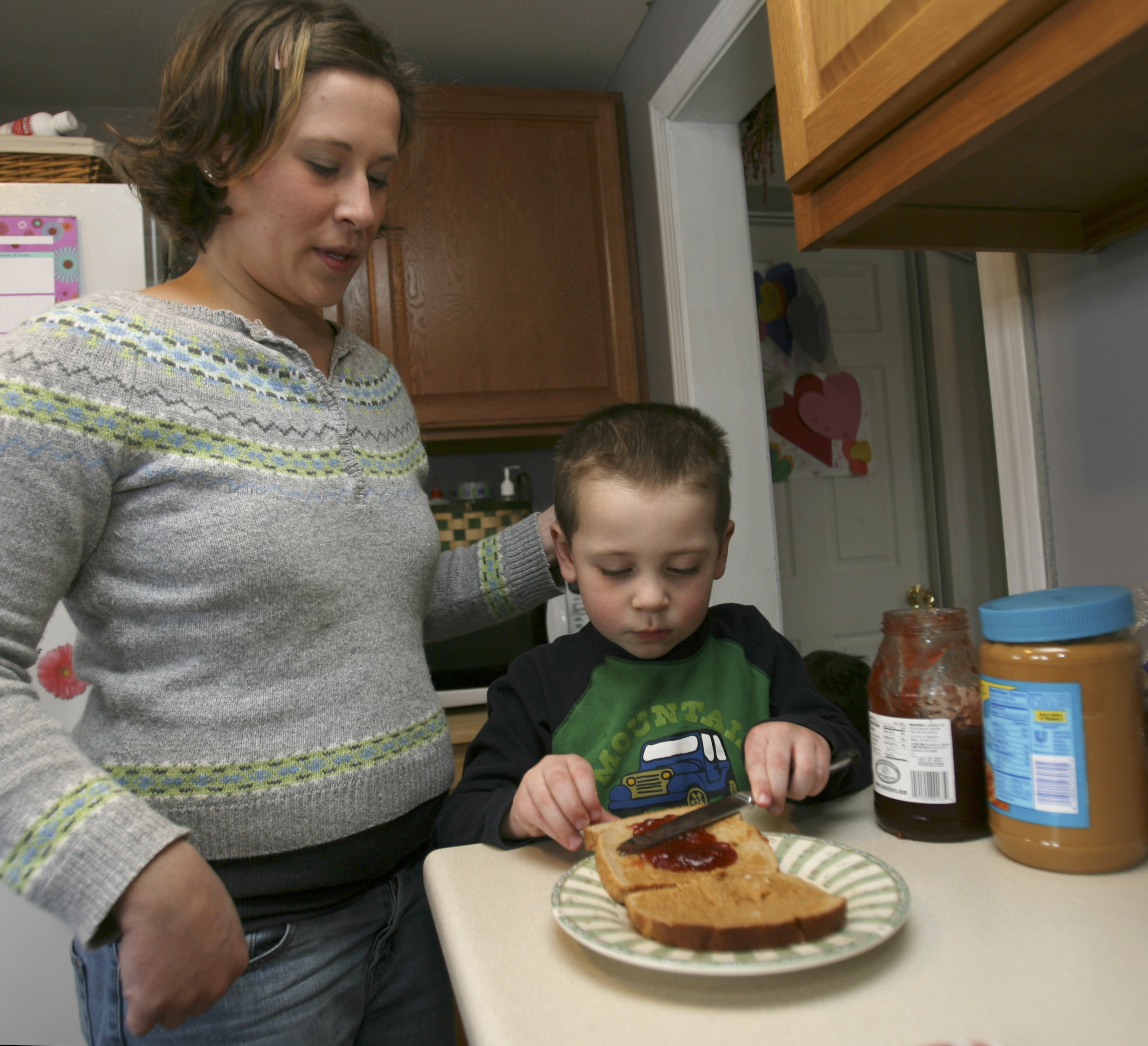Peanut butter scare changes kids’ lunchbox rituals
Company at center of product recalls files for bankruptcy

Eleana Walsh watches her son Carter make his peanut butter and jelly sandwich Friday in Bow, N.H. Many parents are questioning whether they should continue packing their kids’ lunches with PB&J or disregard the combination entirely, in light of the national salmonella outbreak.
Concord, N.H. ? The nationwide salmonella outbreak has left many parents in a situation as sticky as peanut butter itself: Should they pack their kids’ lunches with PB&J or stay away from the old standby?
Jarred peanut butter sales were down significantly last month compared to the previous year, suggesting that many children are going without their favorite sandwiches even though leading brands of jarred peanut butter have not been recalled.
Other parents are taking a more moderate approach, sticking with the jarred stuff and avoiding everything else, or carefully combing through the recall lists before shopping.
It’s a dilemma even President Barack Obama has faced: Earlier this month, he said his younger daughter eats peanut butter sandwiches several times a week. “And you know, I don’t want to have to worry about whether she’s going to get sick as a consequence to having her lunch,” he said. A White House spokesman said Sasha is still eating peanut butter.
In Seabrook, Texas, Dayna Steele is more worried that her 9-year-old son will become sick if he doesn’t eat peanut butter. After years of trying to get him to eat other foods, his pediatrician said, “He’s fine. Let him eat all the peanut butter he wants. When he meets a girl, he’ll start eating something else.”
Steele, a former rock deejay turned motivational speaker, has been holding her breath every time another recall notice pops up online, but she is confident for now that the tubs of Kroger-brand peanut butter her son favors are safe.
“Maybe it’s my rose-colored glasses, but I do want to believe that if a company like Kroger, who stands to lose a lot, felt like there was any danger whatsoever with their jarred peanut butter, that there would be an immediate announcement,” she said.
The salmonella outbreak has sickened some 600 people in 43 states and is being linked to nine deaths. More than 1,900 products have been recalled, and the company at the heart of the recall — Peanut Corp. of America — is under FBI investigation and filed for bankruptcy Friday. Leading brands of jarred peanut butter are not affected, but some parents aren’t taking any chances.
Camille Hurst of Tallassee, Ala., used to buy a jar of peanut butter a week for her three children. Before the recalls, she switched to an all-natural brand because of concerns about unhealthy ingredients. Now she has sworn off peanut products entirely.
“Once they find it in one major brand it is found in others,” she said. “Just like in the melamine contamination, we were told it was only in a few products but then more and more came up.”
Hurst, 31, said she is frustrated that there is no real way for consumers to trace the origins of their food.
“We are blind consumers who trust and rely on the government and manufacturers, and they are abusing that trust and putting the health of consumers in jeopardy,” she said.
That attitude is further evidence that consumers have grown less trusting of government, said Michal Ann Strahilevitz, a professor of marketing and consumer behavior at Golden Gate University in San Francisco.
“Americans feel that they trusted officials to monitor a lot of things that they clearly did not monitor carefully enough. The economy is one example. However, people are particularly risk-averse when it comes to what they feed their families,” she said. “So no surprise, federal assurances are not going to make all the fear go away.”
Government assurances also tend to get lost in a sea of media coverage, said David Urban, professor of marketing at Virginia Commonwealth University. The message that comes through is “peanutsunsafe.”
“It’s a good example of what gets through to consumers and what doesn’t,” he said. “The big negative headline that has any connection to one’s children is really going to stick.”
There are plenty of parents, however, who aren’t reacting with an all-or-nothing approach.
In Bow, N.H., Eleana Walsh has thrown out any processed products that contain peanuts or peanut butter, including items that haven’t been recalled. But Walsh, a mother of two boys, also hasn’t given up jarred peanut butter.
“With the economy going the way it is I need peanut butter to be safe. We will be relying on this to stay alive if things don’t look up,” she joked.







